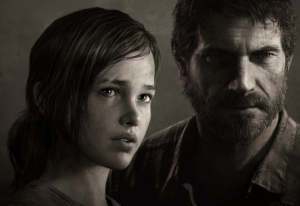
When I turned off The Last Of Us this morning before starting my day in earnest, Joel and Ellie had just strolled into Colorado, with Joel having made an on-the-fly decision for the both of them that essentially cements their relationship for good, come what may. It’s a great, subtle bit of storytelling, well-earned, and it definitely portends the endgame approaching, considering who we’re planning on possibly meeting at the University I’ve just come across. I’m excited for it to be done. A proper review is finally happening when it’s all over, in which I will tear directly into my issues with the game.
That’s not to say I don’t like The Last of Us. I’m fairly certain unless the game’s final act is The Godfather of shitting the bed, I’m actually going to be fairly kind to it. It is very much the next step in Naughty Dog continuing the artistic legwork they began on Uncharted: deepening the gameplay while growing their storytelling skills, developing characters, becoming experts at getting God’s honest performances from a couple billion pixels.
One thing I will not be doing, despite the colorful analogy above, is saying it comes within spitting distance of Citizen Kane.
Or most drama, really. The comparison worth making is to Telltale’s Walking Dead, and The Last Of Us is even falling short of that bar. It is still, however, turning out to be a solid, well-executed example of both human and zombie horror, tense, brutal action, and great character work. I am, overall, enjoying it. That’s enough for me to be warm towards it when all’s said and done. The game is hitting the marks it aims for.
There’s a sect of gamers for whom this simply is not enough, and its embarrassing how many of them are actually who we’re passing off as journalists. I thought for sure we had reached the absurdity nexus when we started applying it to Metroid Prime, and that’s a game I feel a lot stronger about than The Last of Us. It’s the best FPS of the last 15 years that doesn’t boot up with the Valve logo. But, somehow, that’s not enough. Greatness can’t be measured in its own terms, in its own medium. It has to be Citizen Kane, or Casablanca, or Shawshank. And now we’re applying it to a game where you spent most of your time running away from mushroom zombies. These are comparisons tossed around by folks desperately clinging to the idea that any AAA game that dares to actually give two shits how its characters are portrayed is the Willy Wonka Golden Ticket towards legitimacy. I’m willing to bet these are many of the same folks who used to troll Roger Ebert whenever some new remotely dramatic title would come out, message him like proud preschoolers who just made their first macaroni n’ glue artwork, then throw a tantrum when he came back unimpressed.
Gamers and those who cover gaming have inherited the massive, burdensome chip on their shoulders about this from comics. In the years when every couple of months someone would have to defend Splatterhouse and Lethal Enforcers as more than just Clockwork Orange-y murder machines, this desperate need to have the normals look at a game like Chrono Trigger or Final Fantasy VI and see art and beauty made perfect sense. Today, guess what? The war is over. I’ve been able to open a copy of Time Magazine and see a flowery video game review. There is new interactive art happening every single week. Most of it is profoundly ignored. So, why then is The Last of Us suddenly the game-changer? Is it just the visibility? Are people so taken by Joel and Ellie’s story that it trumps every single dramatic game made prior? Because this is the pedestal we’re looking at when we start dragging other so-called legitimized artforms into the conversation, and a resounding zero of the video games we’ve attempted to place up there are capable of reaching for more than a few moments at a time.
Here’s an open weekend project for those same reviewers proclaiming The Last of Us as the next step in digital art: Write a review of Citizen Kane. Watch the film again. Take note of the year. Maybe even watch a few more films from that era. Note the laundry list of things NO OTHER MEDIUM BUT FILM was able to do, and none had done prior. Deep focus shots. Low angles to make characters seem larger than life. That mindblowing mirror shot in Kane’s last days. Score as emotional punctuation. Naturalistic, overlapping dialogue delivery. The story structure. The use of silence. The list is pretty damned extensive.
 Now put pen to paper on that review. Pour your mind out. Read it over a few times. Now think about The Last of Us. Actually, let’s expand it, and include Bioshock: Infinite in here, since this is also, apparently, the future of the medium, as touted by other writers this year. What do these two games do that NO OTHER GAME prior has done? As gameplay and as drama, both of these games are blatant children of their forebears, with The Last of Us using the same mechanics and storytelling tools as Uncharted, Infinite using the same tools as Bioshocks 1 and 2, and their System Shock grandparents.
Now put pen to paper on that review. Pour your mind out. Read it over a few times. Now think about The Last of Us. Actually, let’s expand it, and include Bioshock: Infinite in here, since this is also, apparently, the future of the medium, as touted by other writers this year. What do these two games do that NO OTHER GAME prior has done? As gameplay and as drama, both of these games are blatant children of their forebears, with The Last of Us using the same mechanics and storytelling tools as Uncharted, Infinite using the same tools as Bioshocks 1 and 2, and their System Shock grandparents.
I’m willing to grant Bioshock Infinite an edge here. The ending is a hard right swerve into truly exhilarating territory, and one of the greatest mindfucks ever perpetrated on the player, and yes, I’m including “Would you kindly?” in with that. It is also, ironically, a sequence that employs zero of the gameplay mechanics we’ve been using the 10-12 hours that precede it. No guns. No vigors. No skyhooks. It’s just a long interactive walk, paying off story threads and swimming with far reaching ideas, the kind that will define that series from here on. It recolors how we perceive everything we played prior, to the point that the second playthrough isn’t the wide-eyed wonder of games prior being thrown into a new world, but the disquiet of knowing a new truth about the fabric of the universe we find ourselves in, and reliving it with new insight. That ending is the next level, the next generation. And it is completely clipped at the knees by making the player have to trudge through a mediocre first person shooter to get there.
The Last of Us doesn’t even have far-reaching ideas on its side. What it does well, it does with character, staging, quality of acting and presentation and every once in a while, all that stuff is actually in the player’s control. Everything The Last of Us does with subtlety and dialogue and characterization in its cutscenes could have been done as a film, or even as a book, losing nothing in the process. As a gameplay experience, it’s running, jumping, climbing, shooting, and upgrading, just like every other modern action game I’ve ever played, and the first time you sneak around a gang of marauders who blatantly don’t see the hapless NPC trailing you around like a puppy dog even though she’s sticking out of cover like a sore thumb, any immersiveness beyond the fact that the player is playing a video game is shattered. When you start thinking about the things that make The Last of Us a touchstone experience for this medium, what part of it is when you’re beating Clickers to death with a lead pipe? The game is an okay video game. The game is only a great game when it’s not a game.
Now, here’s the irony with me and writing an article about Citizen Kane: It’s a story I actively kinda hate, about an insufferable, selfish son of a bitch we are expected to empathize with because he had a shitty childhood. It is that, while simultaneously being a film that takes my breath away in its ambition, and when you try analyzing it, you realize there is no other way to tell Charles Foster Kane’s story except in the framework of sound and moving visuals. It is inarguably an achievement in its medium for this, and none of my hatred of its main character has ever changed that. The hurdle that AAA gaming has been falling ass over teakettles on for the last few years is titles trying so damned hard to achieve these heights–more often than not, failing anyway–and forgetting it has a player. Interactivity is the ONLY thing separating gaming from other artforms. If the part that’s not interactive is the part that we’re holding up as the standard bearer for all to see, we’ve already creatively embarrassed ourselves in public, and games writers doubly so for not calling it out as such. If you’re going to throw superlatives out there, at least throw them at Rockstar, Valve, or Bioware, companies that at least invite the player inside to participate in the games-as-art experiment, but even then, its rare we get beyond being able to tell a story where we don’t need to get the player to step back so we can let the CG budget handle some things. Even Red Dead Redemption, which time is really starting to reveal as the closest the medium has ever gotten to breaking the glass Art ceiling, still can’t get off the cinematic crutch to truly become its own thing.
And on some level, this is FINE. Never minding that plenty of the best games of the post-Playstation era have taken that very approach, gaming’s growing up process has led us to this strange pre-pubescent stage where movies and video games are 13-year olds at their first prom, and their friends are daring each other to go dance. Eventually, they do, and its weird, and stunted, and awkward, but it’s also something that needs to happen, and keep happening so maybe, one day, they develop into people who are ready for a real relationship. The gaming industry figuring out how to use the tools at its disposal to tell quality stories, and sussing out how to bind that with interactivity is a stilted, embarrassing process that will absolutely lead to something amazing, and frankly already has, either in terms of pure enjoyment, or at least the noble attempts to reach greater heights. These are exciting times to be a gamer, and to work in gaming in terms of what the medium is capable of.
But just like those kids would be idiots to think they found their one true love at the Sadie Hawkins dance in 1983, so should gaming ease back on the throttle thinking that just because a studio has figured out how to apply the basic tenets of storytelling to a medium that by its very nature is bad at storytelling doesn’t mean we’ve reinvented the wheel. Gaming ultimately shouldn’t be aiming to reinvent the wheel. Gaming should be aiming to invent the fucking hovercraft, and we should be holding it to that standard. That’s how we get better games, and better games journalism to go with it.
Please tell me again how shivving zombies in the neck is doing that for us?
